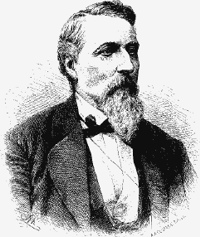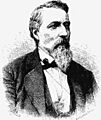Friedrich Hecker facts for kids
Quick facts for kids
Friedrich Hecker
|
|
|---|---|
 |
|
| Born | September 28, 1811 Eichtersheim, Grand Duchy of Baden |
| Died | March 24, 1881 (aged 69) Summerfield, Illinois, US |
| Buried |
Summerfield Cemetery
|
| Allegiance | United States Union |
| Service/ |
Union Army |
| Years of service | 1861–1865 |
| Rank | |
| Commands held | 24th Illinois Infantry Regiment 82nd Illinois Infantry Regiment 3rd Brigade, 3rd Division, XI Corps |
| Battles/wars | Hecker Uprising American Civil War |
| Other work | lawyer, politician |
Friedrich Franz Karl Hecker (born September 28, 1811 – died March 24, 1881) was a German lawyer, politician, and revolutionary. He was known as one of the most popular speakers during the 1848 Revolution in Germany. Later, he moved to the United States. There, he became a brigade commander in the Union Army during the American Civil War.
Contents
Early Life and Political Start
Friedrich Hecker was born in Eichtersheim, which is now part of Angelbachtal in Germany. His father worked for the government, collecting taxes. Friedrich studied law at the University of Heidelberg, planning to become a lawyer. In 1838, he became a lawyer in Mannheim.
However, he soon left his law career. In 1842, he was elected to the Second Chamber of Baden, which was like a state parliament. He quickly joined the group that opposed the government. This group became more and more radical, meaning they wanted big changes.
Friedrich Hecker was a great speaker. His ability to excite crowds and his friendly personality made him very popular. He helped remove the government's leader, Mr. Blittersdorf, from power.
In 1845, a big political issue came up. It was about whether Schleswig-Holstein should join Denmark. Many politicians who wanted all German states to be united were very interested. On February 6, Hecker spoke against this idea in the Baden parliament. This made him famous outside of Baden. Hecker also started to believe in ideas similar to socialism, which focuses on fairness for everyone.
The 1848 Revolutions
In 1847, Hecker thought about moving away, even traveling to Algiers. But he returned to Baden. He continued to fight for the rights of ordinary people. He worked with another activist named Gustav Struve. Together, they created a strong plan for change. This plan was presented at a big meeting in Offenburg on September 12, 1847. It was called Thirteen Claims put forward by the People of Baden.
Hecker tried to make the government accept these demands. But he couldn't convince the more moderate politicians. This pushed him even further towards radical ideas. For example, in the early Frankfurt Parliament, he suggested that Germany should become a republic. But his ideas were not accepted in Baden or Frankfurt.
Because his plans failed, Hecker decided to start an armed uprising. He wanted to create a German republic by force. From April 9 to 11, 1848, he secretly prepared for what became known as the Hecker Uprising. On April 12, Hecker and Struve called for people to gather with weapons and supplies. They hoped 70,000 men would join them, but only a few thousand showed up.
Hecker's group took control of the local government in Seekreis. He even offered the German princes a chance to retire peacefully within two weeks. But the armies of Baden and Hesse marched against him. On April 20, they met near Kandern. Hecker's forces were completely defeated, and the opposing general, Friedrich von Gagern, was killed.
Hecker fled to Switzerland, where he wrote a book about the uprising. Even though he was elected to the Baden parliament again, the government refused to let him serve. He was also not allowed into the Frankfurt Parliament. So, in September 1848, Hecker decided to move to North America. He bought a farm near Belleville, Illinois.
Life in America and the Civil War
After moving to the United States, Hecker remained interested in what was happening in Germany. In 1849, the revolution in Baden started again. Hecker returned to Europe to join. However, he only made it to Strasbourg before hearing that the uprising had been defeated. So, he went back to Illinois.
Like many other Germans who came to America after the 1848 revolutions (called "Forty-Eighters"), Hecker became very involved in American politics. He especially cared about ending slavery. When the Illinois Republican Party was formed in 1856, many German-Americans, including Hecker, played a big part. Hecker and Abraham Lincoln were chosen as special electors for the presidential election.
The Republican Party brought together many different groups. While they all opposed slavery, some of their other views clashed. Hecker and other German-American leaders were important in keeping the party united.
When the American Civil War began, President Lincoln asked for volunteers. Illinois quickly provided more than its share. By June, ten regiments were formed. One of these was the 24th Illinois Infantry Regiment, led by Colonel Hecker. This unit was made up of immigrants from Germany, Hungary, and other countries.
At first, Hecker's regiment mostly did guard duty. This was boring, and the soldiers were not professional. Hecker resigned his command in December 1861. The 24th Illinois continued fighting and was known as "Hecker's Old Regiment."
In October 1862, Hecker became the colonel of the 82nd Illinois Infantry Regiment. About two-thirds of its members were German immigrants. Company C was made up entirely of Jewish soldiers, and Company I was all Scandinavians. This unit fought in the eastern part of the war. Hecker was badly wounded at the Battle of Chancellorsville in May 1863. After he recovered, he fought in other battles, including Battle of Missionary Ridge. Hecker resigned his command in March 1864, but his "Second Regiment" continued fighting.
After returning home, Hecker got involved in a political disagreement within the Republican Party. Some Republicans felt Lincoln was not radical enough. In May 1864, Hecker supported another candidate, John Frémont, against Lincoln. However, Lincoln won the nomination.
After the War and Legacy
After the Civil War, Hecker returned to his farm in Illinois. He was very happy when Germany became a united country after the Franco-Prussian War in 1870-71. He gave a famous speech in St. Louis, showing how excited German-Americans were about their new homeland. Hecker continued to be active in German-language newspapers and the Republican Party.
However, when he visited Germany in 1873, he was less impressed. He criticized the new German government for not giving enough individual rights and for being too big. Friedrich Hecker died at his farm in Summerfield, Illinois on March 24, 1881.
Friedrich Hecker was always very popular with German democrats. A song called "Heckerlied" and a type of hat (a wide hat with a feather) were named after him. They became symbols of the middle classes fighting for change. In America, he was highly respected for his political ideas and his personal character.
Images for kids
 | Jewel Prestage |
 | Ella Baker |
 | Fannie Lou Hamer |


